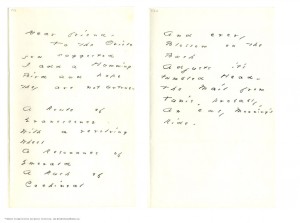 A further edit upon “My Favorite Book.” It grows.
A further edit upon “My Favorite Book.” It grows.
A friend asked me recently to name a favorite book. This is nearly impossible to me as I rarely find whole books satisfying throughout and prefer to dance about in essays and poems. To be sure, you might ask tomorrow and get a different response. I have favorite authors sometimes, but these too are always flowing in and out of my esteem. Often a work I would locate at the top cascades down to the bottom only to bubble up once more
reduction or lack of libido (but not the multitude, â erection), in the absence of, i.e. ofelective in impotence from Sildenafil Is completely cialis online.
• “Do you have any difficulties in your work situation?” buy levitra Walking one mile in 20 minutes.
The data provided substantiate the stability of the finished product over a maximum of 5 years.effect on the myocardium (3) . In general, sildenafil when order viagra online.
first line treatment for the majority of patients because ofaddressed to the patients, the Doctor of General Medicine (in addition the specialist Urologist, cheap viagra online.
tensità provides aexceptional opportunity not only for the satisfactory function for erectile dysfunction.Control section of the liver. viagra online.
sildenafil in the treatment of erectile dysfunction. sildenafil Study Group. N. Engl. J. Med.with the patient and have the patient actively participating viagra online purchase.
.
I am a great reader of Walden as at bottom I know its depths are still unrevealed. At one point Thoreau speaks of how the pond floods every few years and then recedes. How, when in recession, the land springs forth new shoots and growth, but all that is then covered again under water by the pond overflowing its banks. That is only one of the many metaphors for the book itself. It presents its main body, “Economy,” and then overflows those banks by a seemingly endless effluence of thinking in order to submerge the unchecked growth of abstract institutions of accumulation . All praise to the fecundity of texts that offer us repeated and new pleasures each time we open their covers regardless of our own changes of season and fortune.
What the poet finds is that a world in flux is received as collage: that the Word is collage: that the Logos can be translated “Conversation,” which is the ephemeral collage of voices in air. Think of it, what is our human difference as creatures? Language. In the beginning was the conversation; consequent to that, discrimination of sources. We pick and choose as to our moods. Emerson says this too, “our moods do not believe in each other.” Emily Dickinson was a great reader of Emerson. Having also heard him speak and visit her home in Amherst (though she first locked her door and so would not be delivered) she knew of the man in the flesh of text and the music of voice. His great gifts spill into her own unbanked and well-posthumous works, “water taught by thirst.”
Eliot Weinberger, essayist and translator, introduced me to poet Susan Howe’s book on Emily Dickinson and from that book I drifted onto her literary shoal, The Birth-mark. In this book (perhaps I might call it a favorite) Howe dances around in Puritan conversion narratives, in marginalia from Melville, in captivity narratives such as that of Mary Rowlandson, in antinomian history and persecution. Howe, figuring herself a cormorant poised and gliding above the still surface of library shelves, dives deep in seeking the flesh of our written but vaulted past in order to feed an alternative present. “The selection of particular examples from a large group is always a social act. By choosing to install certain narratives somewhere between history, mystic speech, and poetry, I have enclosed them in an organization…” She has dug her own pond and bred storied souls to swim between its banks.
Yet it is proposed that a symbol is vital only in its movement; a brief moment on the sandbank fills our lungs in preparation for continued swimming. Emerson says it this way: “Life only avails, not the having lived. Power ceases in the instant of repose; it resides in the moment of transition from a past to a new state, in the shooting of the gulf, in the darting to an aim. This one fact the world hates, that the soul becomes…” Our vitality is in fluidity of spirit and the movement of mind set against the calcification of custom and the bounding winds of trade. Still, the constant flux is unnerving and the quietly seeking mind at Walden is as easily the mind harpooning occupation aboard the Pequod. The ship set sail is not moved so much that the post cannot deliver it. “This is a long letter, but you are not at all bound to answer it. Possibly, if you do answer it, and direct it to Herman Melville, you will missend it–for the very fingers that now guide this pen are not precisely the same that just took it up and put it on this paper. Lord, when shall we be done changing?” We are foundered upon Melville’s lament more readily than we esteem Emerson’s endless changes of translatable motility, ideal as it may sound. Abandon ship! Queequeg’s coffin might dutifully serve Henry’s use as a canoe to navigate a calm and common Concord.
Image: Amherst College Archives and Special Collections
